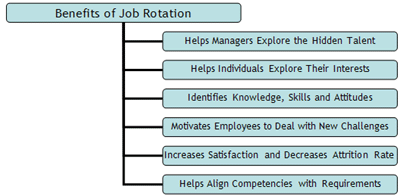Advantages and Disadvantages of Job Analysis
April 3, 2025
 Advantages and Disadvantages of Job Analysis
Advantages and Disadvantages of Job Analysis
Though job analysis plays a vital role in all other human related activities but every process that has human interventions also suffers from some limitations. The process of job analysis also has its own constraints. So, let us discuss the advantages and disadvantages of job analysis process at length. Advantages of Job Analysis Provides First…
 Approaches to Job Design
Approaches to Job Design
Job design is the next step after job analysis that aims at outlining, and organizing tasks and responsibilities associated with a certain job. It integrates job responsibilities and qualifications or skills that are required to perform the same. There are various methods or approaches to do this. The important ones are discussed below Human Approach…
 How Smart Job Rotation Policies Can Enhance Organizational and Employee Effectiveness
How Smart Job Rotation Policies Can Enhance Organizational and Employee Effectiveness
What is Job Rotation and How It Can Enhance Organizational Effectiveness Job Rotation or the practice of moving employees between various projects in organizations can enhance organizational and employee effectiveness. By ensuring that employees do not stagnate or remain stuck in a particular project for extended periods of time, organizations can actualize motivated and inspired…
Job rotation is considered as an effective tool for successful implementation of HR strategy. It is about settling employees at the right place where they can deliver the maximum results. In today’s highly competitive world, this can be proved as the best strategy to find the immediate replacement of a high-worth employee from within the organization.
Finding the most suitable people and shifting them to take on the responsibilities of a higher level is a tough task. Job rotation helps HR managers determine who can be replaced by whom and create a suitable and beneficial fit.
A properly planned and carried job rotation process plays an essential role in strengthening the position of an organization and helps it deal with uncertain and tentative outer environment. Let’s discuss the benefits of job rotation process at length in order to realize its importance and the potential:

Job rotation is an alternative to reduce the boredom caused due to repetitiveness of tasks and revive their willingness to handle a job and challenges involved in it with same excitement and zeal.
Your email address will not be published. Required fields are marked *